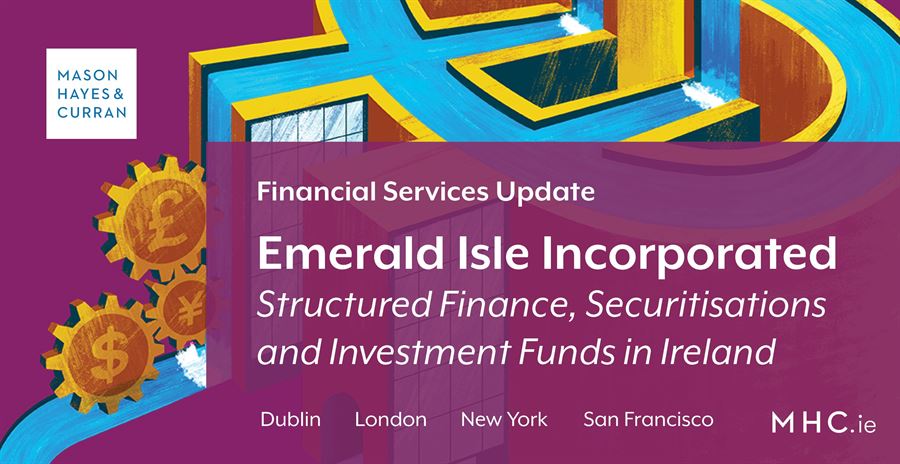Emerald Isle Incorporated: Structured Finance, Securitisations & Investment Funds in Ireland

Ireland is an outward looking and globally connected economy. We have long established business links to Europe, the US, the UK and beyond. Irish government policy is consistently pro-business and a stable and consistent corporate tax rate is central to that policy. Thanks to domestic demographics and its membership of the EU, Ireland’s economy has access to, and continues to successfully attract, a highly educated skilled workforce.
Ireland’s common-law tradition, coupled with the rules and regulations comprising the EU’s capital markets and financial services framework (which apply in Ireland), makes it well suited to international financial transactions. Our robust and commercially sophisticated court system and fully independent financial services regulator, the Central Bank of Ireland, provide predictability and dependability to market participants who choose to structure their transactions in, or through, Ireland.
Ireland is a particularly popular and competitive location for (i) the establishment of structured finance and securitisation special purpose vehicles (SPVs) and (ii) domiciling and administering investment funds. Ireland has a specially designed tax regime for structured finance and securitisation transactions - the Section 110 regime – and a bespoke form of Irish corporate investment funds vehicle – the ICAV.
We provide a brief outline of the benefits of Section 110 SPVs and ICAVs. We also consider the benefits of listing debt securities at Euronext Dublin.
SPVs and the Section 110 regime
As of Q3 2019, there are more than 2,493 SPVs incorporated in Ireland holding €851 billion in assets. This includes 26.5% of euro area FVCs (i.e. financial vehicle corporations, an EU term for securitisation vehicles) and 24% of euro area FVC assets, which is evidence of Ireland’s popularity as an SPV location. This is the 2nd highest number of euro area FVCs and the highest level of euro area FVC assets.
A key driver of this activity is the Section 110 regime, which is set out in section 110 of the Taxes Consolidation Act 1997. Section 110 provides a tax neutral regime for securitisation transactions. Under this regime the taxable profits of the Section 110 SPV are calculated in the same manner as a trading company. Therefore, expenses incurred wholly and exclusively for the purposes of the business are generally deductible including interest and, in certain circumstances, profit participating coupons payable on the debt securities held by investors which satisfy certain requirements.
In order to qualify under the Section 110 regime, an SPV must:
- Hold and/or manage ‘qualifying assets’
- Be an Irish tax resident
- Carry on its business in Ireland
- Ensure that the first qualifying assets it acquires have a total value of at least €10,000,000
The definition of qualifying assets includes financial assets such as shares, bonds and other securities; futures, options, swaps, derivatives and similar instruments; invoices and all types of receivables; and obligations evidencing debt (such as loans and deposits). It also includes plant and machinery, such as aircraft. The broad range of qualifying assets makes Section 110 SPVs extremely versatile in securitisation transactions, although there are limited circumstances where it will not be appropriate.
A Section 110 SPV which has issued debt securities should also typically be able to avail of an exemption from Irish withholding tax in respect of interest paid on those securities and from Irish stamp duty on transfers of the debt securities. A specific VAT exemption should also apply to many management services provided to Section 110 SPVs.
Investment funds and ICAVs
Ireland is one of the largest investment fund domiciles in the world. The Irish funds industry has more than €4.7 trillion of assets under administration with €2.5 trillion of this managed by Irish domiciled funds. More than 14,000 funds are serviced in Ireland, of which 7,415 are Irish domiciled.
As with structured finance, the Irish Government supports the investment funds industry, and in its latest strategy paper “Ireland for Finance 2025”, it sets out plans to consolidate year on year growth in the funds industry.
The vehicle of choice for the establishment of Irish funds is the ICAV. The ICAV is a type of Irish corporate investment fund that is regulated and is subject to prudential supervision by the Central Bank of Ireland.
ICAVs can be utilised for funds established as Undertakings for Collective Investment in Transferable Securities (UCITS), which can be distributed to retail investors. Or as alternative investment funds (AIFs), which are targeted at professional investors. Below, we refer to ICAVs which are established as AIFs that are regulated under the Alternative Investment Fund Managers Directive (AIFMD) which are required to designate an alternative investment fund manager (AIFM).
ICAVs benefit from a 24 hour authorisation process by the Central Bank. Accordingly, if the ICAV’s legal advisers file the relevant documents with the Central Bank and certify that the ICAV complies with the specified regulatory requirements, the Central Bank will authorise the ICAV the following business day.
Given its status as a regulated fund that is domiciled in a transparent onshore jurisdiction, an ICAV should be eligible for investment by institutional investors. An ICAV that appoints a European AIFM is able to utilise the AIFMD marketing passport and can make a pan-European offering of its shares/units to professional investors throughout the EEA.
Ireland has a very favourable tax regime for investment funds which are regulated by the Central Bank, such as ICAVs, unit trusts, investment limited partnerships and other corporate funds. ICAVs / funds are generally exempt from Irish tax on income and gains derived from their investment portfolios. Generally no Irish withholding taxes will arise on payments made by the ICAV / fund to investors who are not resident or ordinarily tax resident in Ireland. No stamp duty is payable in Ireland on the issue, transfer, repurchase, redemption of shares in an ICAVs / funds. Another benefit of using an ICAV is that it can make an election (ie. “check the box”) to be treated as a flow through/ partnership for US tax purposes, where advantageous to do so. Also, it may be possible to combine an ICAV structure with a Section 110 SPV to assist with foreign withholding tax issues in certain circumstances- this needs to be looked at on a case by case basis.
ICAVs that constitute AIFs are not subject to investment restrictions that limit the range of property and investments that an ICAV may acquire. Consequently, ICAVs can be established as hedge funds, real estate funds, private equity funds, master-feeder funds, fund of funds, loan originating funds, life settlement funds to name a few.
Note a different tax regime applies to ICAVs/ funds which are treated as Irish Real Estate Funds (IREFs).
Listing on Euronext Dublin
The stock exchange in Dublin - Euronext Dublin - is the leading exchange worldwide for listing debt securities. A listing on either its regulated market or its Global Exchange Market (GEM) provides advantages both in terms of liquidity and tax exemptions. The regulated market is an EU regulated market. GEM is an exchange regulated market and multilateral trading facility operated by Euronext.
Euronext offers quick turnaround times, which include a maximum of three business days for the first offering document review, and a turnaround of two business days for follow on reviews. Staff are highly responsive and accessible for direct discussion of listing and regulatory queries.
Conclusion
Ireland has developed a market leading position with continued policy and regulatory support. While Brexit poses challenges, Ireland is well placed to continue serving investors as a useful and friendly location from which to build an investment hub into Europe and globally. Having a transaction structured using an Irish Section 110 SPV or ICAV will allow continued unfettered access to the EU and may prove desirable for UK, EU and global arrangers, managers, investment managers and issuers.
Our Structured Finance & Securitisations and Investment Funds teams have considerable experience in advising on, and managing, these transactions. If you would like more information about the attractiveness of doing business in Ireland, or any other general queries, please contact us.
The content of this article is provided for information purposes only and does not constitute legal or other advice.
Share this:





